Last Saturday, EFSP had a post on a postcard series with the stars of the Comédie-Française by the French publisher FA (F.A. Christensen). Ivo Blom acquired also another fantastic postcard series with male Comédie-Française stars. Today, we present this series published by a company called PMM and the photos were made by Boyer. Ivo thinks the date of the portraits must be between 1890 and 1910. Soon, another post will follow here with a series of coloured postcards of Comédie-Française vedettes.

French postcard by PMM. Photo: Boyer, Paris.
Pierre Laugier (1864-1907) was an actor of the Comédie-Française from 1885, becoming sociétaire in 1894. Memorable parts he had in 'Tartuffe' (as Orgon), 'L'Avare' by Molière, 'Les Folies amoureuses (ás Albert) by Jean-François Regnard, 'Le Gendre de M. Poirier' by Emile Augier et Jules Sandeau, 'Il ne faut jurer de rien' by Alfred de Musset, and 'Thermidor' by Victorien Sardou. He died, aged just 42, from scarlet fever at the bedside of one of his two daughters. He was the grand-nephew of François Arago. As far as known he didn't act in films.

French postcard by PMM. Photo: Boyer, Paris.
Charles Le Bargy (1858-1936) was already a famous stage actor in his time, performing at the Comedie-Française when he debuted in the cinema as the perfidious King Henry III in L'Assassinat du Duc de Guise/The Assassination of the Duke de Guise (André Calmettes, Charles Le Bargy, 1908).
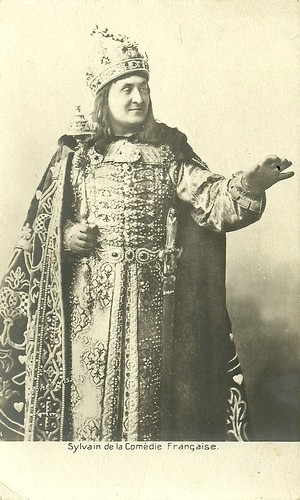
French postcard by PMM.
Eugène Silvain (1851-1930), better known as Sylvain and Silvain, was a prominent French stage actor, though he is best remembered as the evil bishop Cauchon in Carl Theodor Dreyer’s silent masterpiece La passion de Jeanne d’Arc/The Passion of Joan of Arc (1928).
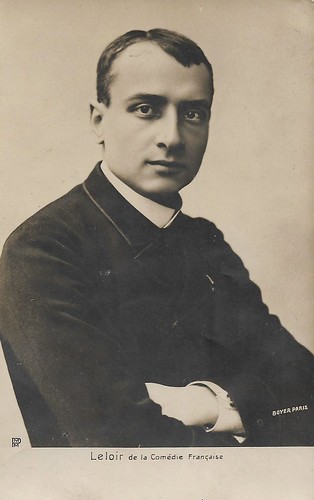
French postcard by PMM. Photo: Boyer, Paris.
Louis Leloir (1860-1909), aka Leloir and originally Louis Pierre Sallot, was a French actor, and a Sociétaire of the Comédie-Française between 1889 and 1909. Parallel to his stage career, he was appointed as a teacher at the Conservatoire de musique et déclamation in 1894, and as the vice-president of the Société des artistes dramatiques in 1897. Because of his courageous behaviour during the 1900 fire at the Comédie-Française, he was awarded the Légion d'Honneur the same year. When he died in 1909, he was a board member of the Comédie-Française and one of its regular stage directors.
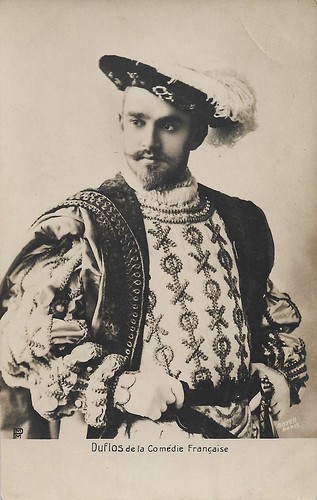
French postcard by PMM. Photo: Boyer, Paris. The costume could refer to Victor Hugo's 'Hernani', in which Duflos played Don Carlos, the future Charles V.
Raphaël Duflos (1858-1946) was a French famous Comédie-Française stage actor, who also acted in a handful of French silent films. He joined the Paris Comédie-Française in 1884. Between 1883 and 1898 he also acted outside of the Comédie, in the 1890s often at the Théâtre du Gymnase. He was Sociétaire at the Comédie-Française between 1896 and 1924 (as the 331st member) and became an honorary member in 1925. He also taught at the National Conservatory of Dramatic Art, where he had among his pupils Huguette Duflos. They married in 1910 but divorced in 1928.

French postcard by PMM. Photo: Boyer, Paris.
Jules Truffier (1856-1943) was a respected actor of the Comédie-Française. Truffier jr. entered the Comédie-Française in 1875, became a Sociétaire there in 1888, retired in 1913, and in 1922 became Sociétaire Honoraire. All in all, he played some 150 parts in an almost 40 years time span. In 1914 he quit acting in 'Maître Favilla', an adaptation by himself of a piece by George Sand, and in the same year became the manager of the Études classiques de la Comédie-Française, so the staging of the classic repertory by the Comédie. This he did until 1918/1919. As far as known, he didn't act in a film, but between 1906 and 1929, he was a teacher at the Conservatoire and trained future screen actors such as Berthe Bovy, Pierre Dux, and Pierre Blanchar.
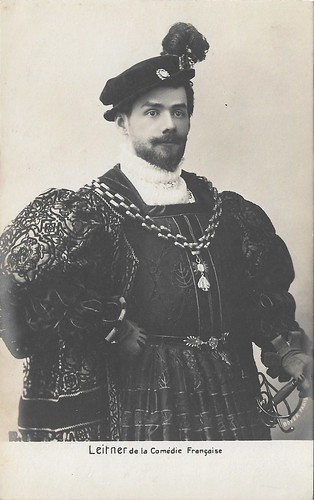
French postcard. Photo: Boyer, Paris. Jules Leitner is dressed as Charles V (Don Carlos) in Victor Hugo's 'Hernani'. He played this tole first in 1906.
Jules-Louis-Auguste Leitner (1862-1940) was a French stage actor of the Comédie-Française. As a student at the National Conservatory of Declamation in Paris, Leitner won a First Prize in Tragedy and a First Prize in Comedy. He entered the Comédie-Française in 1887 and was appointed as a Sociétaire (the 330th) in 1896, which he continued to be until 1919. Leitner was also a teacher at the Paris Conservatory and saw his young pupil Élie Calvé (1904-1929) die on stage in 1929 after the latter had just learned that he had won the 1st Prize for Comedy. Leitner acted in a few Film d'Art productions including Jésus de Nazareth/Jesus of Nazareth (André Calmettes, Henri Desfontaines, 1911).
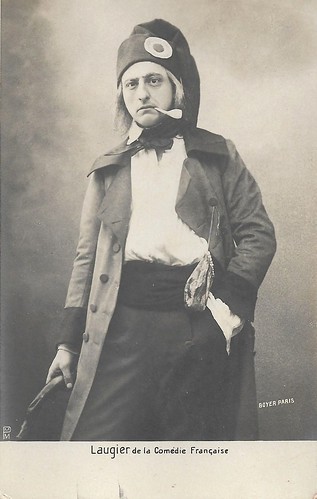
French postcard. Photo Boyer, Paris. Pierre Laugier's outfit may refer to Victorien Sardou's play 'Thermidor', in which Laugier played Marteau, first in 1891.
Pierre Laugier (1864-1907) was an actor of the Comédie-Française from 1885, becoming a Sociétaire in 1894. He had memorable parts in 'Tartuffe' (as Orgon), 'L'Avare' by Molière, 'Les Folies amoureuses' (as Albert) by Jean-François Regnard, 'Le Gendre de M. Poirier' by Emile Augier and Jules Sandeau, 'Il ne faut jurer de rien' by Alfred de Musset, and 'Thermidor' by Victorien Sardou. He died, aged just 42, from scarlet fever at the bedside of one of his two daughters. He was the grand-nephew of François Arago. As far as known, he didn't act in films.

French postcard by PMM. Photo: Boyer, Paris.
Gustave Worms (1836-1910) was a French stage actor of the Comédie-Française. He entered the company in 1858 and was appointed as a Sociétaire in 1878. In 1900 he left the Comédie. Gustave Worms was the father of stage and screen actor Jean Worms. Marguerite Moreno, Édouard de Max, and Lugné-Poe were among his pupils at the Conservatoire, the Parisian drama school. As far as is known, Worms didn't act in a film, while his son was a prolific film actor from the 1910s onward.
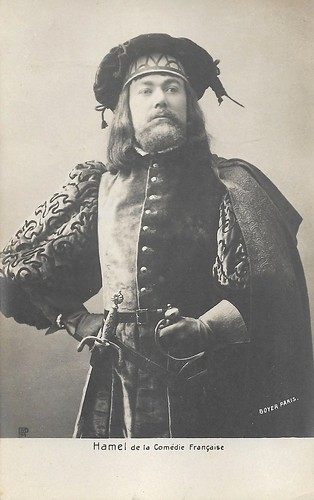
French postcard by PMM. Photo: Boyer, Paris.
Augustin-Julien Hamel was active at the Comédie-Française in 1882 and between 1884 and 1910.
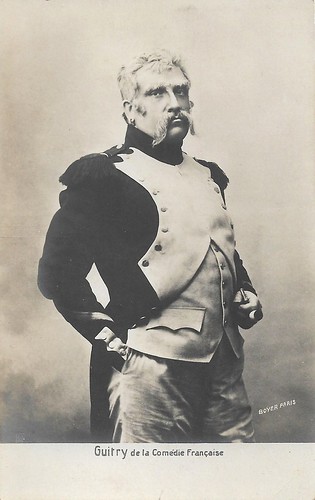
French postcard by PMM. Photo: Boyer, Paris. Lucien Guitry as Flambeau in 'L'Aiglon' (1900) by Edmond Rostand.
Lucien Guitry (1860-1925) was considered the preeminent French actor of his day. For many years, he played opposite Sarah Bernhardt. He also appeared in silent films like Tosca (André Calmettes, 1908) and Ceux de chez nous/Those of Our Land (Sacha Guitry, Frederic Rossif, 1915). He was married to Jeanne Desclois and Renée de Pont-Jest, and his son was the well-known actor-writer-director Sacha Guitry.

French postcard by PMM. Photo: Boyer, Paris.
Edmond Got (1822-1901) was a French stage actor of the Comédie-Française. He entered the company in 1844 and was appointed as a Sociétaire in 1850, and as a Doyen between 1873 and 1894. In 1894 he left the Comédie. In the mid-19th century, he was one of the most respected stage actors, beloved for his grand style.

French postcard by PMM. Photo: Boyer, Paris.
Georges Berr (1867-1942) in Paris, was a French actor and dramatist, a member and Sociétaire of the Comédie-Française from 1886 to 1923. Under the pseudonyms Colias and Henry Bott, he wrote several plays, particularly in collaboration with Louis Verneuil. He was Jean-Pierre Aumont's uncle. He acted in only one film, the Molière adaptation Les précieuses ridicules/The Affected Ladies (1910), directed by himself, and he directed one other film, L'enfant prodigue/The Prodigal Son (1909), both for Pathé Frères. However, Berr was a most active playwright whose plays were often adapted for the cinema, such as Le Million/The Million (1931), filmed by René Clair, and scripted by Clair and Berr himself. Berr worked on three other film scenarios, while he was the dialogue writer for four more films, including La porteuse de pain/The Bread Peddler (René Sti, 1934).

French postcard by PMM. Photo Boyer, Paris.
Jacques Fenoux (1870-1930) entered the Comédie-Française in 1895, became a Sociétaire in 1906, retired in 1924, and became a Sociétaire honoraire in 1925. As the site of the Comédie states: "Fenoux was the type of a conscientious member, able to move effortlessly from one job to another, from small to large parts. He was appointed an honorary member in 1925 but continued to play until his last days. He barely disappeared two weeks after having last interpreted Bazile, from 'The Barber of Seville'." As far is known, his only performance was in Jacques de Féraudy's film Molière, sa vie, son oeuvre/Molière, his life, his work (1922), in which actors of the Comédie-Française can be seen rehearsing plays by Molière.
Sources: Comédie-Française (French), Fondation Jérome Seydoux, Filmographie Le Film d'Art by Eric Le Roy, Wikipedia (English and French), and IMDb.

French postcard by PMM. Photo: Boyer, Paris.
Pierre Laugier (1864-1907) was an actor of the Comédie-Française from 1885, becoming sociétaire in 1894. Memorable parts he had in 'Tartuffe' (as Orgon), 'L'Avare' by Molière, 'Les Folies amoureuses (ás Albert) by Jean-François Regnard, 'Le Gendre de M. Poirier' by Emile Augier et Jules Sandeau, 'Il ne faut jurer de rien' by Alfred de Musset, and 'Thermidor' by Victorien Sardou. He died, aged just 42, from scarlet fever at the bedside of one of his two daughters. He was the grand-nephew of François Arago. As far as known he didn't act in films.

French postcard by PMM. Photo: Boyer, Paris.
Charles Le Bargy (1858-1936) was already a famous stage actor in his time, performing at the Comedie-Française when he debuted in the cinema as the perfidious King Henry III in L'Assassinat du Duc de Guise/The Assassination of the Duke de Guise (André Calmettes, Charles Le Bargy, 1908).

French postcard by PMM.
Eugène Silvain (1851-1930), better known as Sylvain and Silvain, was a prominent French stage actor, though he is best remembered as the evil bishop Cauchon in Carl Theodor Dreyer’s silent masterpiece La passion de Jeanne d’Arc/The Passion of Joan of Arc (1928).

French postcard by PMM. Photo: Boyer, Paris.
Louis Leloir (1860-1909), aka Leloir and originally Louis Pierre Sallot, was a French actor, and a Sociétaire of the Comédie-Française between 1889 and 1909. Parallel to his stage career, he was appointed as a teacher at the Conservatoire de musique et déclamation in 1894, and as the vice-president of the Société des artistes dramatiques in 1897. Because of his courageous behaviour during the 1900 fire at the Comédie-Française, he was awarded the Légion d'Honneur the same year. When he died in 1909, he was a board member of the Comédie-Française and one of its regular stage directors.

French postcard by PMM. Photo: Boyer, Paris. The costume could refer to Victor Hugo's 'Hernani', in which Duflos played Don Carlos, the future Charles V.
Raphaël Duflos (1858-1946) was a French famous Comédie-Française stage actor, who also acted in a handful of French silent films. He joined the Paris Comédie-Française in 1884. Between 1883 and 1898 he also acted outside of the Comédie, in the 1890s often at the Théâtre du Gymnase. He was Sociétaire at the Comédie-Française between 1896 and 1924 (as the 331st member) and became an honorary member in 1925. He also taught at the National Conservatory of Dramatic Art, where he had among his pupils Huguette Duflos. They married in 1910 but divorced in 1928.

French postcard by PMM. Photo: Boyer, Paris.
Jules Truffier (1856-1943) was a respected actor of the Comédie-Française. Truffier jr. entered the Comédie-Française in 1875, became a Sociétaire there in 1888, retired in 1913, and in 1922 became Sociétaire Honoraire. All in all, he played some 150 parts in an almost 40 years time span. In 1914 he quit acting in 'Maître Favilla', an adaptation by himself of a piece by George Sand, and in the same year became the manager of the Études classiques de la Comédie-Française, so the staging of the classic repertory by the Comédie. This he did until 1918/1919. As far as known, he didn't act in a film, but between 1906 and 1929, he was a teacher at the Conservatoire and trained future screen actors such as Berthe Bovy, Pierre Dux, and Pierre Blanchar.

French postcard. Photo: Boyer, Paris. Jules Leitner is dressed as Charles V (Don Carlos) in Victor Hugo's 'Hernani'. He played this tole first in 1906.
Jules-Louis-Auguste Leitner (1862-1940) was a French stage actor of the Comédie-Française. As a student at the National Conservatory of Declamation in Paris, Leitner won a First Prize in Tragedy and a First Prize in Comedy. He entered the Comédie-Française in 1887 and was appointed as a Sociétaire (the 330th) in 1896, which he continued to be until 1919. Leitner was also a teacher at the Paris Conservatory and saw his young pupil Élie Calvé (1904-1929) die on stage in 1929 after the latter had just learned that he had won the 1st Prize for Comedy. Leitner acted in a few Film d'Art productions including Jésus de Nazareth/Jesus of Nazareth (André Calmettes, Henri Desfontaines, 1911).

French postcard. Photo Boyer, Paris. Pierre Laugier's outfit may refer to Victorien Sardou's play 'Thermidor', in which Laugier played Marteau, first in 1891.
Pierre Laugier (1864-1907) was an actor of the Comédie-Française from 1885, becoming a Sociétaire in 1894. He had memorable parts in 'Tartuffe' (as Orgon), 'L'Avare' by Molière, 'Les Folies amoureuses' (as Albert) by Jean-François Regnard, 'Le Gendre de M. Poirier' by Emile Augier and Jules Sandeau, 'Il ne faut jurer de rien' by Alfred de Musset, and 'Thermidor' by Victorien Sardou. He died, aged just 42, from scarlet fever at the bedside of one of his two daughters. He was the grand-nephew of François Arago. As far as known, he didn't act in films.

French postcard by PMM. Photo: Boyer, Paris.
Gustave Worms (1836-1910) was a French stage actor of the Comédie-Française. He entered the company in 1858 and was appointed as a Sociétaire in 1878. In 1900 he left the Comédie. Gustave Worms was the father of stage and screen actor Jean Worms. Marguerite Moreno, Édouard de Max, and Lugné-Poe were among his pupils at the Conservatoire, the Parisian drama school. As far as is known, Worms didn't act in a film, while his son was a prolific film actor from the 1910s onward.

French postcard by PMM. Photo: Boyer, Paris.
Augustin-Julien Hamel was active at the Comédie-Française in 1882 and between 1884 and 1910.

French postcard by PMM. Photo: Boyer, Paris. Lucien Guitry as Flambeau in 'L'Aiglon' (1900) by Edmond Rostand.
Lucien Guitry (1860-1925) was considered the preeminent French actor of his day. For many years, he played opposite Sarah Bernhardt. He also appeared in silent films like Tosca (André Calmettes, 1908) and Ceux de chez nous/Those of Our Land (Sacha Guitry, Frederic Rossif, 1915). He was married to Jeanne Desclois and Renée de Pont-Jest, and his son was the well-known actor-writer-director Sacha Guitry.

French postcard by PMM. Photo: Boyer, Paris.
Edmond Got (1822-1901) was a French stage actor of the Comédie-Française. He entered the company in 1844 and was appointed as a Sociétaire in 1850, and as a Doyen between 1873 and 1894. In 1894 he left the Comédie. In the mid-19th century, he was one of the most respected stage actors, beloved for his grand style.

French postcard by PMM. Photo: Boyer, Paris.
Georges Berr (1867-1942) in Paris, was a French actor and dramatist, a member and Sociétaire of the Comédie-Française from 1886 to 1923. Under the pseudonyms Colias and Henry Bott, he wrote several plays, particularly in collaboration with Louis Verneuil. He was Jean-Pierre Aumont's uncle. He acted in only one film, the Molière adaptation Les précieuses ridicules/The Affected Ladies (1910), directed by himself, and he directed one other film, L'enfant prodigue/The Prodigal Son (1909), both for Pathé Frères. However, Berr was a most active playwright whose plays were often adapted for the cinema, such as Le Million/The Million (1931), filmed by René Clair, and scripted by Clair and Berr himself. Berr worked on three other film scenarios, while he was the dialogue writer for four more films, including La porteuse de pain/The Bread Peddler (René Sti, 1934).

French postcard by PMM. Photo Boyer, Paris.
Jacques Fenoux (1870-1930) entered the Comédie-Française in 1895, became a Sociétaire in 1906, retired in 1924, and became a Sociétaire honoraire in 1925. As the site of the Comédie states: "Fenoux was the type of a conscientious member, able to move effortlessly from one job to another, from small to large parts. He was appointed an honorary member in 1925 but continued to play until his last days. He barely disappeared two weeks after having last interpreted Bazile, from 'The Barber of Seville'." As far is known, his only performance was in Jacques de Féraudy's film Molière, sa vie, son oeuvre/Molière, his life, his work (1922), in which actors of the Comédie-Française can be seen rehearsing plays by Molière.
Sources: Comédie-Française (French), Fondation Jérome Seydoux, Filmographie Le Film d'Art by Eric Le Roy, Wikipedia (English and French), and IMDb.
No comments:
Post a Comment